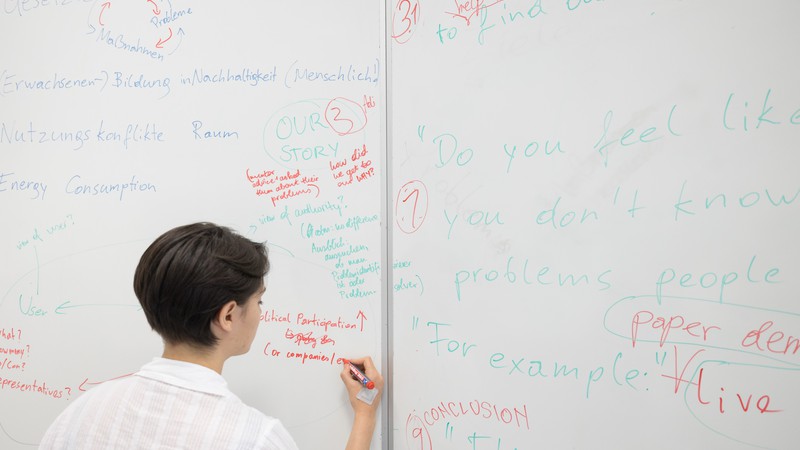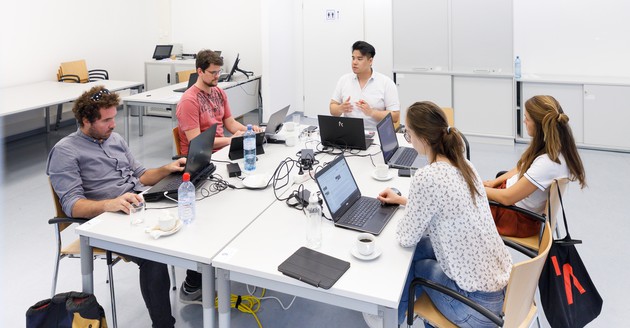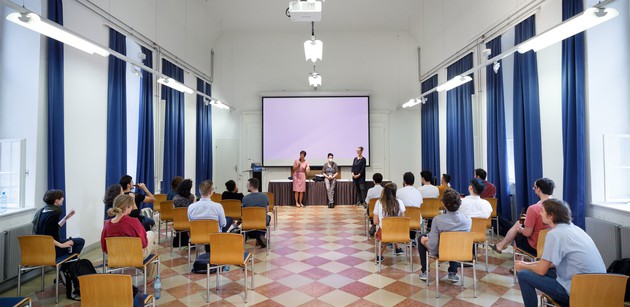
© www.derknopfdruecker.com
Ein Beitrag des Wissenstransferzentrum-Ost.
Lösungsansätze für gesellschaftliche Herausforderungen entwickeln – das war die Zielsetzung des #WTZHackathon 2021. 19 Personen, aus zehn (Fach-)Hochschulen, Forschungseinrichtungen und unterschiedlichen Disziplinen, stellten sich von 13.-15. September 2021, am Campus der Universität Wien, dieser schwierigen Aufgabe.
Inspiriert von Präsentationen, zur Agenda 2030 (SDG Watch Austria) und zu aktuellen Problemstellungen (Stadt Wien), arbeiteten fünf interdisziplinäre Teams an digitalen Lösungsansätzen zu Herausforderungen rund um die Themen Mobilität und Umwelt. Um die Teilnehmer*innen über eine mögliche Finanzierung ihrer Projekte zu informieren, präsentierte die FFG ihre Impact Innovation Förderung. Antje Enzi von UpLeveled führte durch die Veranstaltung.
Unterstützt wurden die Teams bei der technischen Umsetzung, Sichtung von Datensetzen, beim Erstellen von Business Plänen und bei der Vorbereitung des Pitchs von Expert*innen der Start-Ups UpLeveled und Cortecs, sowie der Stadt Wien.

© www.derknopfdruecker.com
Folgende Projekte haben am WTZHackathon 2021 teilgenommen:
Treehopper
The City of Vienna’s climate strategy involves planting 25,000 new trees. Toward that goal, we were posed with the challenge of creating a participatory digital solution that considers important criteria such as parking spaces, heat islands, etc. Our solution, Treehopper, aims to foster citizen engagement and empower their participation through the combination of AR and DL-powered microclimate prediction models, with the help of embedded expert knowledge and codified regulations. This makes finding optimal tree placements a process that can be well-considered, data-driven, and minimally detrimental to the individual.
Happy Velo
Women, kids and newbies are much less involved in cycling in Vienna because of lack of safe routes. We developed a prototype of a community driven platform, which helps users to get a pleasant bicycle mobility experience. The „Happy Velo“ mobile app uses StadtWien road data, as well as users‘ real-time data to generate the safest cycling routs and show the nearest bicycle repair shops, parking lots and bike-friendly cafes. This will allow to close existing gender gap in Vienna cycling community. Besides, due to the gamification feature that we implemented, this app will attract kids and young people to use bicycles more often. As a result, there will be more female, young and newbie cyclists in Vienna, which will lead to a significant decrease of CO2 emissions.
Prolution
Do you sometimes feel like you don’t know what problems other people have? Most experts and decision-makers do, forcing them to begin their roadmap with goals instead of problems. They work hard on solutions to find themselves searching for the problems they may or may not solve afterwards. We reverse that circle of hunting down goals first and finding problems for those goals along the way only. We represent a prosperous database of problems experienced by the most relevant part of our system, the people. That way, one can quickly inform himself about what burns on people’s minds and follow up by creating a solution tailor-made to existing instead of irrelevant problems. The team behind Prolution is building a social media platform to get decision-makers to discover the root causes of their target groups problems. Any form of collaboration with our project is welcome, and our team is available at team@prolution.org. The platform’s core functionality is the ability to seamlessly include reported problems from all social classes into the workflows of experts, solving their most significant drawdown, not knowing what to solve. Automated neuronal sentiment and content analysis keeps the groundbreaking social media platform clean and makes sure it remains accessible for everyone.
Sharing Mobility
“Sharing Mobility” presented a mobile APP which associates users to specific institutions (universities, companies, municipalities…). With this association, users can collect points through tracking distances travelled by bicycle. This points feed into a reward system. This approach connects the concept of gamification, competition with community building.
For the „Sharing Mobility“ team, riding a bike is a way of making citizens happier and healthier, lower emission and contributing to the SDGs.
Needs up
In order to be responsible towards environment and people, respecting past and future generations, we need to update our neighbourhood organism. With the help of the “needs up“ tool and live events, old Viennese districts are being transformed into cooperative units that produce long-term architectural visions. Fiction accelerates the implementation of a new reality. Based on expert analyses and collective needs, architecture is transforming itself and creates a world of new working and living possibilities. Public places are experiencing their renaissance. Community rituals are renewed and neighbours are becoming ready to tackle 21st century challenge.
Nach ~48 Stunden intensiver Arbeit präsentierten die Teams ihre Ergebnisse vor einer Jury, bestehend aus Michaela Trippl, (Universität Wien, Fakultät für Geowissenschaften, Geographie und Astronomie), Sigrid Koloo (SDG Watch Austria, Themeninitiative Wirtschaft) und Angelika Winkler (Stadt Wien). Gewonnen hat das Projekt Treehopper.

© www.derknopfdruecker.com
Bei Fragen wenden Sie sich an wtz.fsnf@univie.ac.at
Weitere Informationen unter https://www.wtz-ost.at/
Sie lasen einen Gastbeitrag. Die darin enthaltenen Meinungen sind keine Positionen von SDG Watch Austria oder von ÖKOBÜRO als Medieninhaber.
-
FfD4 2025: Die Konferenz, die die Zukunft der globalen Entwicklungs-finanzierung entscheidet
29. April 2025
-
Nachlese: SDG Dialogforum Kärnten, 13.11.2024
3. Dezember 2024
-
Klimakrise und Armut: Wie Armutsbetroffene unter den Folgen des Klimawandels leiden
23. Oktober 2024
-
SDG Watch Austria Workshop bei der Beyond Growth Conference Austria
25. Juni 2024